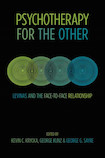Dr. Kevin Krycka’s chapter, “Asymmetry in Psychotherapy”, from the new book he has co-written, brings Gendlin’s philosophy of implicit entry into dialogue with the relational/ethical philosophy of Emmanuel Levinas. Dr. Krycka, an IAFOTs member, says “finding and following the precision of the felt sense is not a viable end in and of itself if we are also oriented toward care for/of the Other, as I believe is the case for psychotherapists. … My experience as a therapist has lead me to see the many ways in which we therapists, as well-meaning and care oriented as we are, sometimes prefer the ‘nicer’ feelings and subtly overlook the disruption to our own sense of identity, and thus potentially forestall that same dynamic in our clinical relationships”.
Psychotherapy for the Other: Levinas and the Face-to-Face Relationship. A number of studies have discussed the implications of Levinas’s ethics for therapy by focusing on the therapist’s relationship to the client, but psychotherapy can also be envisioned as a broader and more ethical endeavor, focusing as well on the responsibility of clients toward the others in their own lives. Levinas’s other-centered perspective inspires these authors to break from standard theory and technique so that neither concepts nor practiced skills remain at the center of therapy, and the client’s freedom no longer remains the desired outcome. Rather, being ethical becomes more than following one’s professional code of conduct, and responsibility is instead the therapist’s primary contribution and the desired outcome of good psychotherapy.

